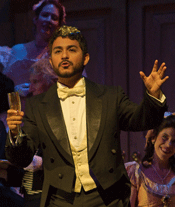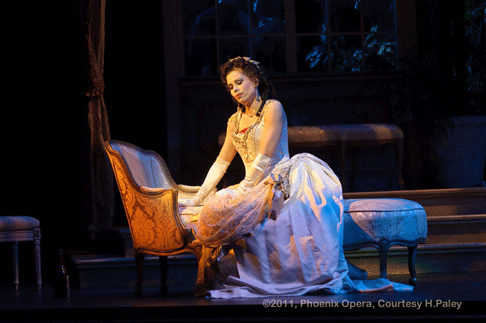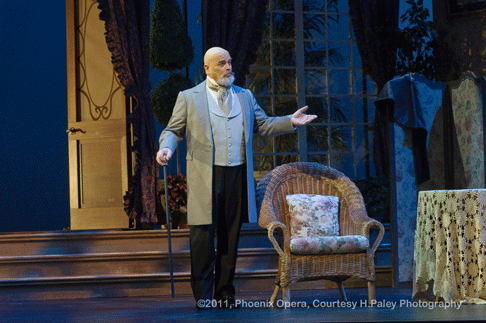10 Mar 2011
La Traviata, Phoenix
Francesco Maria Piave’s Italian libretto for Giuseppe Verdi’s opera La Traviata is based on the French play La Dame aux Camélias.

Francesco Maria Piave’s Italian libretto for Giuseppe Verdi’s opera La Traviata is based on the French play La Dame aux Camélias.
The play was adapted from a novel by Alexandre Dumas fils, who actually knew the real life heroine, Marie Duplessis.
When Alphonsine Rose Plessis was born on the 15th of January, 1824, in the tiny village of Nonnant in Normandy, no one could have imagined that within twenty years she would become the famous courtesan, Marie Duplessis. Her father put her to work at an early age, first as a beggar and later as a prostitute. When he was investigated for child abuse, he sent the girl to live with relatives in Paris. There, at age 15, she began to frequent dances where she hoped to meet men who would pay her living expenses.
 Director of the Paris Opéra Nestor Roqueplan wrote that he once saw her on
the Pont Neuf eating a green apple, but gazing hungrily at the fried potatoes
being sold nearby. He bought her a large portion and watched as she wolfed them
down and even licked the paper in which they had been wrapped. Roqueplan would
recall this incident in 1851 when he spoke with Giuseppe Verdi about bringing
La Traviata to the Opéra.
Director of the Paris Opéra Nestor Roqueplan wrote that he once saw her on
the Pont Neuf eating a green apple, but gazing hungrily at the fried potatoes
being sold nearby. He bought her a large portion and watched as she wolfed them
down and even licked the paper in which they had been wrapped. Roqueplan would
recall this incident in 1851 when he spoke with Giuseppe Verdi about bringing
La Traviata to the Opéra.
Marie worked hard at bettering herself. She not only learned to read and write, but she also attained an appreciation of the arts. When Roqueplan next saw her, he was astonished to note that the little waif from the Pont Neuf had become the fashionable lady on the arm of the Duc de Guiche.
One evening, when Marie was attending a party with Alexandre Dumas, son of the famous writer, she had a dreadful coughing spell. She explained that since there was no cure for her illness she chose to be among interesting people who would distract her from her pain. Dumas continued his affair with her for about a year, but he had to evade detection by her actual protector because he did not have anywhere near enough money to maintain her household. Another of her admirers, Franz Liszt, wrote: “She had a great deal of heart, a great liveliness of spirit and I consider her unique of her kind.She was the most complete incarnation of womankind that has ever existed.” This is the femme fatale we see on the stage as “Violetta” in La Traviata.
On March 4, 2011, Phoenix opera presented Carroll Freeman’s traditional staging of La Traviata at the historic Orpheum Theater. Peter Dean Beck’s set, originally designed for Florida Grand Opera, was easily transformed into the opera’s various scenes. John Lehmeyer’s detailed costumes set the period securely and added considerably to the opera’s visual appeal.

Viennese soprano Julia Koci was a radiantly beautiful Violetta who sang with taste and musicality. She is one of the few interpreters of this role who can truly handle both the coloratura of the first act and the dramatic singing required by the following scenes. Operalia winner Jesus Garcia was a passionate young lover who sang with robust, ringing tones. Together they were an ideal couple in Act I, and a pair of troubled but intriguing lovers thereafter. One could not help reaching for a handkerchief in the last act when Germont, not the soprano, read the letter which comes too late. That was an interesting choice by the director and it worked well.
Germont was sung with panache by veteran French Canadian baritone Gaétan Laperrière. He made you angry as he gave Violetta a piece of his narrow mind in Act II, but he tore at your heart strings at the end with his expressions of remorse. An attractive Flora, Erin Tompkins sang with a solid sound while Francisco Renteria was an unwavering Gastone. Alexis Davis Hazell was a poignant Annina and her husband, Earl Hazell, sang the Commissioner with a stentorian voice. Baritones Christopher Holmes and Christopher Herrera portrayed Baron Douphol and Doctor Grenvil with authority, while bass baritone Andrew Gray proved to be a commanding Marchese.

Company Founder and Artistic Director John Massaro led the rather small orchestra in a smooth, lyrical rendition of the work. The audience response at the end of the opera was tumultuous and it was fitting praise for the excellent performers who brought Verdi’s wonderful opera to life.
Maria Nockin